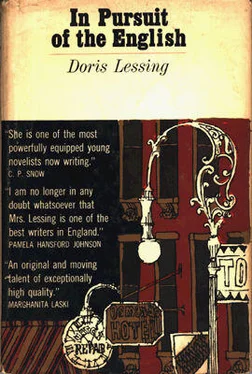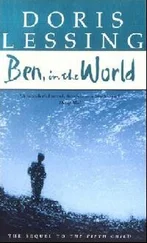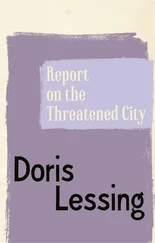My parents were, now I come to think of it, grail-chasers of a very highly developed sort. I cannot even imagine a country in which they would have been definitively ready to settle down without criticism. The nearest I can get to it would be a combination of the best parts of Blackheath or Richmond, merged, or mingled with a really large ranch, let’s say about fifty thousand acres, in the Kenyan Highlands. This would have to be pervaded by a pre-1914 atmosphere, or ambience, like an Edwardian after-glow. Their Shangri-La would be populated thickly, for my mother, with nice professional people who were nevertheless interesting ; and sparsely, for my father, with scamps, drunkards, eccentrics and failed poets who were nevertheless and at bottom decent people.
I would, of course, be the first to blame my parents for my own grail-seeking propensities.
England was for me a grail. And in a very narrowly-defined way. Not long ago people set foot for the colonies — the right sort of people, that is — in a spirit of risking everything and damning the cost. These days, a reverse immigration is in progress. The horizon conquerors now set sail or take wing for England, which in this sense means London, determined to conquer it, but on their own terms.
I have an anecdote to illustrate this. I had been in England for about five years, and was just beginning to understand that I had got the place whacked, when an old acquaintance telephoned to say that he had arrived in London to write a book. He had forever turned his back on his old life, which consisted of making enormous sums of money out of gold mines, drinking a lot, and marrying a succession of blonde and beautiful girls. I visited him in his flat. It was in Mayfair, furnished at immense expense in the most contemporary taste, with two refrigerators. He was very excited that at last he had had the strength of mind to cut all his profits and tackle England. I remember on the whole without regret, the strong, involuntary moral disapprobation that I radiated as he talked. Finally, and the remark welled up from the depths of my being, from the perfervid heart of the myth itself: ‘Do you mean to tell me that you are going to live in a flat that costs twenty-two guineas a week, in Mayfair, with a refrigerator, to write a novel?’
Looking back, I can see that there were several occasions when I could have come to England years before I did. For instance, there was talk of my being sent to school here. That would have meant my being taken on by a section of my family which I detested — I see now quite rightly — by instinct, and without ever having met them. I used to get ill with mysterious spontaneity every time this plan was discussed. I would lie in bed and dream about England, which of course had nothing in common with that place inhabited by my cousins. That England was almost entirely filled with rather dangerous night-clubs, which had a strong literary flavour. I was then fourteen. I think the only person I would have allowed to bring me to England at that time was a father-figure in appearance like Abraham Lincoln, with strong white-slaving propensities, yet fundamentally decent, and with an untutored taste for the novel Clarissa. My most powerful fantasy was of how I would gently release the captives, all of them misunderstood girls of about fourteen, all of them incredibly beautiful, but full of fundamental decency. I would press enough money into their hands (willingly given me by my master for this purpose) to enable them to find themselves, and set them free. At the same time I would be explaining to my master the real and inner significance of the novel Clarissa , while he gently toyed with my breasts, and, kissing me on the brow, willingly handed me large sums of money which would enable me to find myself.
The other occasions when nothing prevented me from coming to England but enough energy to do it, were the same: a powerful inner voice said it was not yet the time. The time, finally, was in 1949, when England was at its dingiest, my personal fortunes at their lowest, and my morale at zero. I also had a small child.
I have it on the highest secular authority that this propensity of mine to do things the hard way amounts to nothing less than masochism, but a higher authority still, the voice of the myth itself, tells me that this is nonsense.
By the time I came, things had been satisfactorily arranged in such a way that the going would be as hard as possible.
For instance. The ships for years after the war were booked months in advance. Yet I know now — and it would have been obvious to anyone but me — that the simple process of bribing someone would have got me a passage on one of the big regular boats. Instead I decided on a much cheaper, but slower, Dutch boat for which I would have to wait in Cape Town. Of course, by the time I had hung about in Cape Town, and spent money for four weeks on that terrible slow boat, it would have been much cheaper to fly.
The moment of arriving in England, for the purposes of the myth, would be when I got to Cape Town. This is because the Cape is English, or, as the phrase goes, is pervaded by the remnants of the old English liberal spirit.
It so happened that the first people I met in Cape Town were English. This was an immediately disturbing experience. They were a university professor and his wife, who had been, the last time I saw them, bastions of the local Communist Party. That had been eighteen months before. Now they had left the Communist Party. Things have now changed so that it is quite possible to leave the Communist Party and retain a sense of balance. In those days, one was either an eighteen-carat, solid, unshakable red, or, if an ex-red, violently, and in fact professionally anti-Communist, The point was, that this volte-face had taken place about six weeks before, and in a blinding moment of illumination at that, like on the road to Damascus. I went into their beautiful house, which was on one of the hills overlooking the bay, I was full of comradely emotions. The last time I had seen it, it was positively the area office for every kind of progressive activity. I was greeted with an unmistakable atmosphere of liberal detachment, and the words: ‘Of course we have left the Party and we are no longer prepared to be made use of.’ Now I was hoping I might be asked to stay a few days while looking for a room; in fact I had been invited to stay any time I liked. I became even more confused as the conversation proceeded, because it seemed that not only had they changed, I had, too. Whereas, previously, I had been fundamentally sound, with my heart in the right place, yet with an unfortunate tendency towards flippancy about serious matters which ought to be corrected, now I was a dogmatic red with a closed mind and a dangerous influence on the blacks who were ever prey to unscrupulous agitators. I was trying to discuss this last bit reasonably, when I was informed that Cape Town was overflowing, that no one but a lunatic would arrive without arranging accommodation, and there was no hope of my finding a room. My situation was, in short, admirably deplorable. While my son has always been the most delightful, amiable and easy-going person, yet, being two years old, he needed to sleep and eat. My total capital amounted to £47. I was informed that the prices for even bad accommodation were astronomical. They telephoned some boarding houses which turned out, much to their satisfaction, to be full. They then summoned a taxi. On my suggestion.
The taxi-driver was an Afrikaner and he had an aunt who ran a boarding house. He instantly took me there, refused payment for the trip, arranged matters with his aunt, carried in my luggage — which was extensive, because I had not yet learned how to travel — taught my son some elementary phrases in Afrikaans, gave me a lot of good advice, and said he would come back to see how I was getting on. He was a man of about sixty, who said he had forty-four grandchildren, but had it in his heart to consider my son the forty-fifth. He was a Nationalist, it was not the first time I had been made to reflect on that sad political commonplace that one’s enemies are so often much nicer than one’s friends.
Читать дальше
Конец ознакомительного отрывка
Купить книгу












